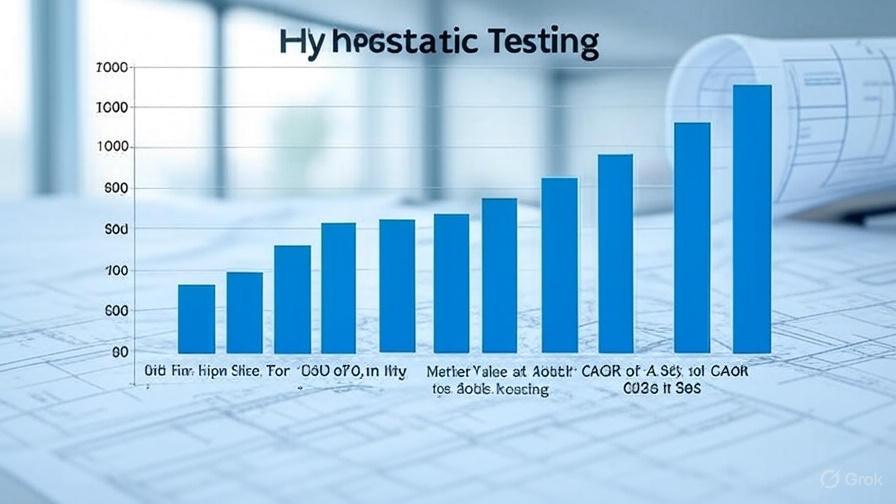Hydrostatic Testing Market to Hit USD 1,067.5 Million by 2035

The global hydrostatic testing market is on track to deliver steady growth, with projections showing expansion from USD 670.7 million in 2025 to USD 1,067.5 million by 2035. Registering a compound annual growth rate (CAGR) of 4.8% during the forecast period, the industry is thriving due to rising safety regulations, ongoing infrastructure upgrades, and technological advancements. Hydrostatic testing continues to serve as a vital non-destructive method for verifying the integrity of pressure vessels, ensuring compliance with international codes across pipelines, refineries, water infrastructure, and aviation sectors.
Full Market Report available for delivery. For purchase or customization, please request here: https://www.futuremarketinsights.com/reports/sample/rep-gb-6539
Drivers of Growth and Industrial Adoption
Pipeline development across North America, the Middle East, and Asia is a key driver, coupled with the need for preventive maintenance in aging infrastructure. Expanding oil production, water treatment projects, and offshore operations are further elevating demand for hydrostatic testing services. Industries are increasingly deploying automated systems equipped with real-time monitoring and cloud-based reporting to enhance accuracy, safety, and compliance.
Hydrostatic testing is now critical across diverse applications such as refineries, chemical plants, and municipal water utilities. Governments are mandating periodic testing of pipelines, boilers, and tanks, creating consistent demand for both mobile and stationary testing units in industrial plants and field service operations.
Regional Growth Insights
North America continues to dominate the global landscape, led by the United States. With vast pipeline networks and stringent regulations enforced by the Department of Transportation (DOT) and Pipeline and Hazardous Materials Safety Administration (PHMSA), hydrostatic testing is a standard practice. Specialized service providers and equipment rental firms have built a mature ecosystem to meet compliance needs.
In Europe, regulatory emphasis on safety and environmental stewardship is expanding applications beyond pipelines to power plants and HVAC systems. The growing focus on renewable gas infrastructure, particularly hydrogen, is unlocking new opportunities.
Asia Pacific is expected to be the fastest-growing regional market, driven by industrialization, refinery expansions, and large-scale government water projects in China, India, and Southeast Asia. Portable and trailer-mounted test systems are gaining traction as infrastructure projects spread into remote regions.
Opportunities and Challenges
Despite robust demand, the market faces challenges such as high equipment costs, test preparation complexities, and environmental considerations regarding water disposal. Smaller firms may find it difficult to invest in mobile testing capabilities due to capital intensity.
Yet, opportunities far outweigh these hurdles. Rising concerns around workplace safety and structural integrity are fueling the shift toward automated and SCADA-integrated testing systems. These solutions offer predictive maintenance, real-time data collection, and cloud documentation, providing operators with significant efficiency gains. The growing appeal of rental models and third-party certification services is also reshaping the market, making advanced testing solutions more accessible.
Market Shifts: Past to Future
Between 2020 and 2024, the market weathered disruptions caused by COVID-19 but rebounded as pipeline projects restarted and stricter audits were introduced. Manual pressure gauges gave way to digital logging tools, laying the groundwork for data-driven compliance.
Looking ahead, from 2025 to 2035, the focus will shift toward smart hydrostatic testing platforms powered by IoT, AI diagnostics, and robotics. Predictive testing cycles, water recycling modules, and modular mobile systems will set new benchmarks. Governments are expected to introduce rules mandating real-time monitoring, encouraging industries to adopt more advanced, plug-and-play testing equipment.
Product Segmentation and Technology Trends
Pump-based systems are set to dominate with a 47.2% share by 2025, thanks to their versatility in delivering regulated fluid pressure for tanks, valves, and pipelines. Electric-powered designs, projected to account for 36.8% of the market, are gaining preference in automated environments due to their efficiency, low maintenance, and compatibility with clean energy requirements.
Competitive Landscape
The hydrostatic testing market remains highly competitive, with both established manufacturers and emerging innovators shaping its future.
Curtiss-Wright Corporation, holding an estimated 15–18% share, leads with modular hydrostatic benches integrated with IoT sensors and global service coverage. Resato International BV, with 13–16% share, has built momentum in Europe and Asia by introducing compact electric test units with touchscreen diagnostics. Reed Manufacturing Company, capturing 9–12%, specializes in rugged manual pumps for contractors and utility providers, while Hydratron Ltd. holds 7–10% with portable test packs designed for offshore and defense industries.
Other notable players such as Cat Pumps, Alemite LLC, Shenyang Elite, Galiso Inc., and Keller AG continue to expand offerings in high-pressure pumps, pneumatic systems, and advanced pressure sensors, catering to diverse industrial applications.
- Art
- Causes
- Crafts
- Dance
- Drinks
- Film
- Fitness
- Food
- Juegos
- Gardening
- Health
- Inicio
- Literature
- Music
- Networking
- Otro
- Party
- Religion
- Shopping
- Sports
- Theater
- Wellness


